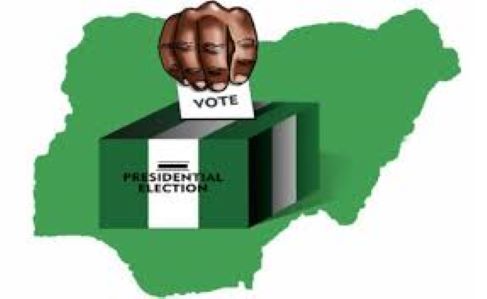Politics in Nigeria has never been a dull theatre. It thrives on suspense, defection dramas, and the constant choreography of power. Lately, the nation’s political landscape has resembled a revolving door, with governors, senators, and lawmakers shuffling in and out of parties at an astonishing speed. Within just forty-eight hours, the governors of Enugu and Bayelsa—Peter Mbah and Douye Diri have switched allegiance to the ruling APC, dragging along a convoy of lawmakers and loyalists. And if the whispers from political corridors are to be believed, Taraba’s Agbu Kefas and several others may soon join the exodus.
The numbers tell the story of a changing tide: the PDP now holds only eight states, while the APC controls twenty-five. In the Senate, APC’s presence swells to 73 members (about 67%), while in the House of Representatives, its 236 seats tower above the PDP’s 80, according to Daily Trust (October 15, 2025). The political arithmetic is shifting, and fast.
Supporters of the ruling party celebrate these defections as divine endorsement—proof, they say, that the winds of destiny are blowing in their favor ahead of 2027. Meanwhile, opposition loyalists, stung and defensive, insist that it is “the people” who decide elections, not governors or elite defections. This familiar debate, whether the will of the people or the machinery of the powerful truly shapes outcomes—sits at the heart of Nigeria’s democracy.
Yet, human psychology has a way of betraying consistency. As the social psychologist Leon Festinger noted in his theory of cognitive dissonance, people tend to embrace narratives that comfort them, even when the facts disagree. Those who once celebrated high-profile defections as signs of “momentum” now preach that defections do not matter. Those who mocked elite influence suddenly discover its moral weight when it benefits their cause.
When the ADC coalition emerged under the blessing of figures like former Vice President Atiku Abubakar, euphoria swept through the opposition space. Every defector, no matter how obscure, was celebrated as a messiah. The digital squares of social media became temples of hope. “More are coming!” was the daily gospel. Yet, the same voices that hailed these defections as victories of destiny now chant that it is “the people” who truly matter. Such selective memory is a timeless feature of political romanticism.
History, however, is a stubborn witness. In 2015, the nation witnessed its first-ever defeat of an incumbent president. It did not happen through spontaneous people’s uprising, but through strategic elite realignment, a symphony of defections, coalition building, and shared ambition. Buhari’s triumph, though celebrated as a people’s revolution, was in truth a masterstroke of elite consensus against an overconfident incumbent.
Ironically, Buhari himself had once contested multiple elections without the comfort of elite backing, relying almost entirely on his cult-like popularity. Yet, it was only when the political titans, the governors, lawmakers, financiers, and party lords pitched their tents with him that victory became possible. Popularity without structure, money, and institutional loyalty, as political scientists like Richard Katz have long argued, is like a river without banks—it flows passionately but directionlessly.
Tinubu’s own 2023 victory tells another story. Despite his party’s federal dominance, he lost in Lagos and Abuja, cities where political sophistication outpaces sentiment. These results have since been weaponized by opposition sympathizers as evidence that the power of incumbency can be defeated. Yet, they often overlook the deeper truth that such outcomes are exceptions, not rules, in the complex ecosystem of Nigerian elections.
So, who truly decides elections in Nigeria—the people or the power brokers?
The honest answer is: both, but not equally. The elites tilt the scale. Governors, legislators, and financiers form the backbone of electoral strategy. Their resources, networks, and control of party structures translate into votes. The ordinary citizen participates, yes—but often within boundaries drawn by elite consensus. As Karl Marx once wrote, “Men make their own history, but not in circumstances of their own choosing.” Nigerian voters act within conditions crafted by political elites.
Money, of course, remains the bloodstream of our democracy. Campaigns are not fuelled by ideals alone but by logistics such as mobilization, media, agents, security, and, yes, “stomach infrastructure.” The masses rarely rally for free; they are mobilized, persuaded, sometimes bought, and often motivated by hope or handouts. Hence, the ruling party enjoys a natural edge: access to state resources and the machinery to distribute them.
And then there is apathy, the silent partner of incumbency. Millions on social media roar like lions but vanish on election day like shadows at noon. The streets are left to party agents, loyalists, and the politically invested few who treat elections not as a civic duty but as an occupation. Thus, the people’s supposed power dissolves into indifference, and the elites’ coordination triumphs.
To claim that “the people decide” without acknowledging these realities is to romanticize democracy. In truth, democracy in Nigeria is an elite orchestra performed to a popular audience. The people cheer, sing, and sometimes vote, but the score is written elsewhere.
Until citizens translate anger into action, tweets into turnout, and emotions into electoral energy, the balance of power will remain what it is: tilted toward those who understand that politics is not a moral contest but a strategic enterprise.
So, when next you hear of another defection, pause before you scoff. In Nigeria, political migration is not betrayal—it is often prophecy.
Bagudu can be reached at bagudumohammed15197@gmail.com or on 0703 494 3575.


